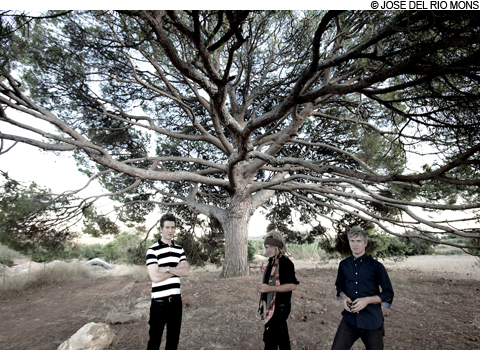
POST-POPULAR Nada Surf have shaken the " '90s one-hit wonder" tag to release a string of solid
power-pop records and develop a cult following. |
For Matthew Caws, songwriting isn't exactly fun. In fact, it's more like agony. If you take Nada Surf's jangly power-pop at face value, that might come as a shock, since the veteran indie trio's songs are crammed full of windows-down melodic joy. But bubbling underneath the glossy surface of their seventh studio album, The Stars Are Indifferent to Astronomy (Barsuk/City Slang), is anguish, and excavating those feelings takes a lot of hard work. "It's about trying to encapsulate this bad feeling in such a way that I can almost put a handle on it," Caws says, "so I can pick it up and put it in the corner, or at least have some control over it."
For Nada Surf, having control has always been a major issue. The trio (vocalist-guitarist Caws, bassist Daniel Lorca, drummer Ira Elliot) skyrocketed to buzz-worthy MTV fame back in 1996 with their angst-fueled narrative rocker "Popular," but in spite of their success they felt creatively boxed in, signed to major label Elektra while their hearts pined for the DIY structure of the indie scene.
Although they never really went away, they were largely written off around the turn of the millennium as a dated, alt-rock one-hit-wonder. But after the band signed to Barsuk (famously home to Death Cab for Cutie), listeners stopped taking their hooky charms for granted, and albums like 2002's Let Go and 2005's The Weight Is a Gift found a home among flannel-wearing post-grads. Nada Surf have earned both critical respect and a devoted following, no longer hiding in the shadow of their solitary hit. At the time of our call, Caws was gearing up for a series of acoustic SXSW dates; meanwhile, Astronomy was picking up critical steam.
In spite of his success, and despite Astronomy featuring some of Nada Surf's most confident, catchy songs to date, Caws doesn't sound upbeat on the new album. Although the music is filled with the trademarks that have defined their sound for more than a decade (ringing electric guitars, glistening vocal hooks, unfussy production), Caws's words have never been darker. Much of Astronomy finds the frontman in a dreamy, disillusioned daze, reflecting on climate change, regretting wasted time, and lamenting our indifference to the transient beauty that surrounds our every waking moment.
"The whole theme throughout the record is just worrying about the environment and not having anything smart to say about it, just being haunted," Caws says. "Even the title phrase is one of my dad's. He's a philosophy professor, and that's something he says in class sometimes to make a point about art and significance: 'A dog doesn't know it's called a dog. And the stars and planets don't know that we gave them names, and it doesn't matter to them.' "
The soaring, Beatles-esque "Jules and Jim" was inspired by a real-life love triangle, but not of the run-of-the-mill soap-opera variety. "I've never been in a physical one, but I've sort of come close to being in an emotional one," Caws offers. "I found that while I really felt like I was at fault for whatever I was feeling — which is so often the case when you're in some kind of emotional upheaval, with one or two of the parties feeling too hard or something — I found that in the midst of this, I really sympathized with all three of us and could identify with all three of us. And I didn't really blame any of us, because we're only guilty of being human."